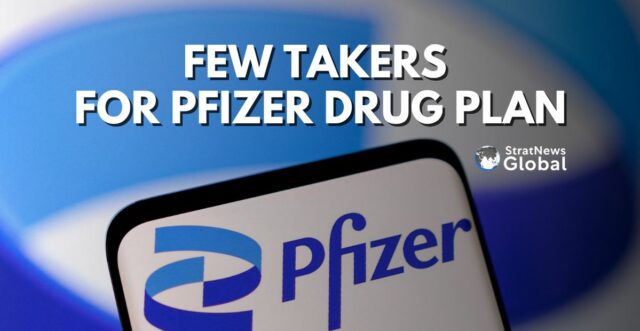Pfizer has so far signed up less than a quarter of the countries targeted under a plan to make its medicines available to the world’s poorest nations at not-for-profit prices, just over two years after it launched.
The programme, which Pfizer called “An Accord for a Healthier World,” launched in 2022 and was expanded to cover more products in 2023. It aims to provide 45 low-income countries affordable access to Pfizer’s entire portfolio of drugs and vaccines, including bestsellers like blood thinner Eliquis and cancer drug Ibrance, as well as new products.
Challenge In Procurement Process
The company had been criticized for its rollout of its COVID-19 vaccine, with some poorer countries waiting for months compared with wealthier ones.
Pfizer chief executive Albert Bourla said in an interview the progress was slower than he had hoped because “few countries are really mobilising themselves to bring the products in”. Ten countries have signed up so far, Pfizer said.
“It is extremely challenging in terms of bureaucracy,” Bourla said. “They need to change the process of how they’re going to procure and they need to register the products, and those are the bottlenecks.”
Many of the countries initially listed, from South Sudan to Myanmar, face significant competing challenges, including conflict, natural disaster and disease outbreaks.
Five countries – Rwanda, Ghana, Malawi, Senegal and Uganda – committed to joining the accord in 2022. Rwanda received the first shipment of 1,500 treatment courses for infectious diseases, inflammatory diseases and some cancers in September of that year, but there have been no further details on drugs or vaccines delivered since.
A Rwandan health official said it had expanded the number of products it could buy from Pfizer from eight to 20, and was working with the company on accessing more.
“Rwanda has moved quickly,” said Julien Mahoro Niyingabira, a spokesperson for Rwanda’s Ministry of Health.
Focus On Off-Patent Products
Pfizer is also in talks with ten more countries to join the programme, but Bourla acknowledged the company had not spoken directly to all of the countries it hoped would join, relying instead in some cases on countries showcasing the program to their neighbours.
“We are actively working with nearly half of the 45 accord-eligible countries,” a spokesperson added by email. They said the accord had the potential to reach one million patients this year, based on doses delivered and product orders.
Bourla said many countries are most interested in Pfizer’s off-patent products, like sterile injectables – products used regularly in hospitals, including basic tools like saline drips.
“It’s not a question of price,” Bourla said, adding that Pfizer’s pricing under the accord for many its off-patent drugs is competitive with generics in the countries.
“It is, of course, the quality (that matters) in countries where they have suffered a lot from counterfeits.”
Bourla said the uptake of innovative drugs has been slower, and the company is working with physicians in the countries on improving access to diagnosis and managing the drugs.
(With input from Reuters)





